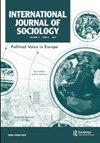Religious Exclusivism and Mass Beliefs about the Religion v. Science Debate: A Cross-National Study
IF 1.1
Q2 SOCIOLOGY
引用次数: 2
Abstract
Abstract When religion and science are in conflict, who supports religion? Using data from 71 diverse societies in the World Values Survey (n = 120,728), this study assesses the relative predictive strength of science optimism, moral concerns about science, religiosity, and religious exclusivism. Perhaps counterintuitively, science beliefs (science optimism, in particular) are weak predictors of the outcome, even in wealthy societies with high levels of scientific productivity. In contrast, believing that only one’s religion is acceptable is the strongest predictor of choosing religion over science; this is generally consistent across religious groups, regions, and specific countries/territories. These findings suggest that making the public more aware of major scientific advances will not, by itself, increase the cultural authority of science—especially if it is explicitly contested by another influential social institution. The implications for social scientific theories of modernization and secularization are discussed.宗教排他主义与大众信仰关于宗教与科学之争:一项跨国研究
当宗教与科学发生冲突时,谁支持宗教?利用世界价值观调查(n = 120,728)中71个不同社会的数据,本研究评估了科学乐观主义、对科学的道德关注、宗教虔诚和宗教排外主义的相对预测力。也许与直觉相反,科学信念(尤其是科学乐观主义)对结果的预测能力很弱,即使在科学生产力水平很高的富裕社会也是如此。相比之下,相信只有一个人的宗教是可以接受的,这是选择宗教而不是科学的最强预测因素;这在宗教团体、地区和特定国家/地区之间通常是一致的。这些发现表明,让公众更多地了解重大的科学进步本身并不能增加科学的文化权威——尤其是当它受到另一个有影响力的社会机构的明确质疑时。讨论了现代化和世俗化对社会科学理论的影响。
本文章由计算机程序翻译,如有差异,请以英文原文为准。
求助全文
约1分钟内获得全文
求助全文

 求助内容:
求助内容: 应助结果提醒方式:
应助结果提醒方式:


